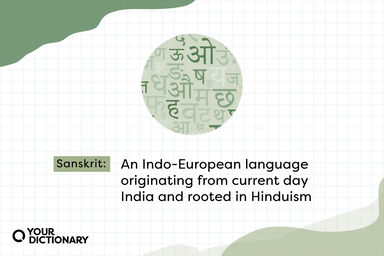Indo-European Definition
ĭndō-yo͝orə-pēən
noun
The Indo-European family of languages: its principal branches are Albanian, Anatolian, Armenian, Baltic, Celtic, Germanic, Greek, Indic, Iranian (often grouped with Indic as the Indo-Iranian subfamily), Italic, Slavic, and Tocharian.
Webster's New World
A family of languages consisting of most of the languages of Europe as well as those of Iran, the Indian subcontinent, and other parts of Asia.
American Heritage
The hypothetical language, reconstructed by modern linguists, from which these languages are thought to have descended: in this sense, Proto-Indo-European is now the preferred term.
Webster's New World
A hypothetical speaker of Proto-Indo-European.
Webster's New World
A member of a people that speaks an Indo-European language.
Webster's New World
Synonyms:
- aryan
- indo-hittite
- Indo-European language
pronoun
Proto-Indo-European: the hypothetical parent language of the Indo-European language family.
Wiktionary
adjective
Designating or of a family of languages that includes most of those spoken in Europe and many of those spoken in SW Asia and India.
Webster's New World
Of or relating to the hypothetical parent language of the Indo-European language family. Also called Proto-Indo-European and abbreviated PIE.
Wiktionary
Of or relating to the hypothetical group of peoples that spread Indo-European languages.
Wiktionary
Synonyms:
Other Word Forms of Indo-European
Noun
Singular:
Indo-EuropeanPlural:
indo-europeansFind Similar Words
Find similar words to Indo-European using the buttons below.




